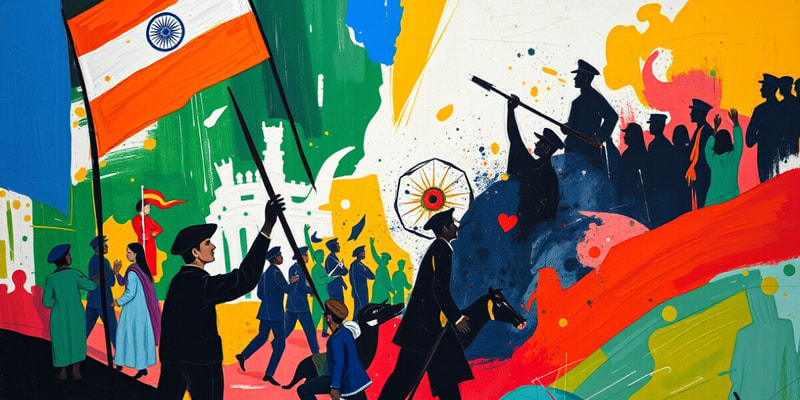Podcast
Questions and Answers
What was one of the significant reasons behind the partition of India?
What was one of the significant reasons behind the partition of India?
Who led the Muslim League and demanded a separate Muslim state?
Who led the Muslim League and demanded a separate Muslim state?
What was the impact of British policy on the partition of India?
What was the impact of British policy on the partition of India?
What were the series of events leading up to the partition of India a result of?
What were the series of events leading up to the partition of India a result of?
Signup and view all the answers
Which leader's mistakes ultimately led to the partition of India?
Which leader's mistakes ultimately led to the partition of India?
Signup and view all the answers
What significant event led to the demand for a separate Muslim state?
What significant event led to the demand for a separate Muslim state?
Signup and view all the answers
Which event aimed to force the British to leave India, but faced division within the Congress over the issue of a Muslim state?
Which event aimed to force the British to leave India, but faced division within the Congress over the issue of a Muslim state?
Signup and view all the answers
What was the consequence of the partition of India that led to widespread communal violence between Hindus and Muslims?
What was the consequence of the partition of India that led to widespread communal violence between Hindus and Muslims?
Signup and view all the answers
Which event had a significant impact on the economies of both India and Pakistan due to the division of resources, infrastructure, and industries?
Which event had a significant impact on the economies of both India and Pakistan due to the division of resources, infrastructure, and industries?
Signup and view all the answers
What created two separate political entities, India and Pakistan, and had significant political consequences for both countries?
What created two separate political entities, India and Pakistan, and had significant political consequences for both countries?
Signup and view all the answers
Study Notes
The National Movement and the Partition of India
The period of the 8th class history curriculum in India covers various aspects of the national movement. One of the most significant events in the national movement was the partition of India. This article will delve into the reasons behind the partition, the events leading up to it, and the impacts it had on the Indian subcontinent.
Reasons for the Partition
The partition of India was a result of several factors, including:
- Religious Differences: India had a predominantly Hindu population and a significant Muslim minority. The Muslim league, led by Muhammad Ali Jinnah, demanded a separate Muslim state due to religious differences and the fear of being a minority in a predominantly Hindu India.
- British Policy: The British had ruled India for over two centuries and implemented a policy of 'divide and rule'. This policy, which aimed to maintain control by exploiting differences between various groups in society, contributed to the partition.
- Pandit Nehru's Mistakes: Jawaharlal Nehru, the leader of the Indian National Congress, was initially against the idea of a separate Muslim state. However, his mistakes such as the Congress's support for a separate electorate for Muslims and his refusal to agree to a federal structure for India, ultimately led to the partition.
Events Leading Up to the Partition
The partition of India was the result of a series of events that unfolded over several years. Some of the significant events include:
- The Lahore Resolution: In 1940, the Muslim League passed the Lahore Resolution, which demanded a separate Muslim state.
- Quit India Movement: The Quit India Movement, led by Mahatma Gandhi, aimed to force the British to leave India. However, the Congress was divided on the issue of the Muslim state, which weakened their position.
- Meeting of the Constituent Assembly: In 1946, the Constituent Assembly was convened to draft India's new constitution. However, the division within the Congress and the demand for a separate Muslim state led to the failure of the assembly.
- Partition Plan: In August 1947, the British announced a partition plan for India. The plan divided the country into two separate states: India and Pakistan.
Impacts of the Partition
The partition of India had several impacts on the Indian subcontinent, including:
- Migration: The partition led to massive migration of people from one country to another. Millions of Hindus and Sikhs moved to India, while millions of Muslims moved to Pakistan.
- Communal Violence: The partition resulted in widespread communal violence between Hindus and Muslims. Thousands of people were killed, and countless others were displaced.
- Economic Consequences: The partition had a significant impact on the economies of both India and Pakistan. The division of resources, infrastructure, and industries led to economic chaos in both countries.
- Political Consequences: The partition led to the creation of two separate political entities, India and Pakistan. This division had significant political consequences for both countries, including their foreign policies and relations with each other.
In conclusion, the partition of India was a significant event in the national movement that had far-reaching impacts on the Indian subcontinent. The reasons behind the partition, the events leading up to it, and the impacts it had on India and Pakistan, continue to be a subject of interest and study even today.
Studying That Suits You
Use AI to generate personalized quizzes and flashcards to suit your learning preferences.
Description
Explore the reasons, events, and impacts of the partition of India through this overview of the national movement. Learn about religious differences, British policy, significant events like the Lahore Resolution and Quit India Movement, and the lasting impacts on migration, communal violence, and the economies and politics of India and Pakistan.




